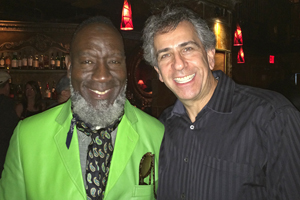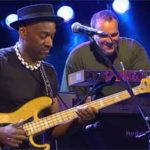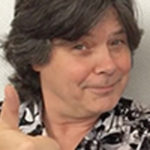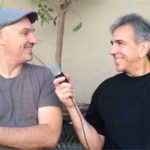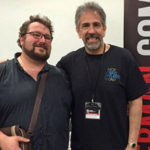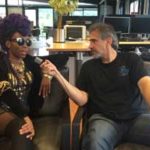Philly bassist talks to FBPO about longstanding Ornette Coleman gig, Bill Cosby and new projects
Exclusive interview with FBPO’s Jon Liebman
January 20, 2014
Philadelphia native Jamaaladeen Tacuma is a world-renowned producer, arranger and bassist. In the mid-’70s, he toured with Ornette Coleman’s electric band, Prime Time, and performed on some of Coleman’s historic recordings, including Dancing in Your Head, Body Meta and Of Human Feelings.
Throughout his impressive career, Jamaaladeen has performed and/or recorded with guitarists Jeff Beck, Carlos Santana, Marc Ribot and James Blood Ulmer, saxophonists Pharoah Sanders, Grover Washington, Jr., David Murray, Odean Pope and James Carter and hip-hop artists the Roots, King Britt and DJ Logic. Tacuma has also released several solo albums to great critical acclaim, including Showstopper, Renaissance Man, Music World and Boss of the Bass. He is a past recipient of the Pew Arts & Heritage Award and the Marcus Garvey Foundation 50th Anniversary Award.
FBPO: Tell me about your musical upbringing.
JT: I grew up in North Philadelphia, in an community with a large African American and Jewish population. This particular area was very inspirational in that there were musicians and people of the arts who lived in the neighborhood. There was a theater named the Uptown, which was part of what they called the Chitlin’ Circuit, just like the Apollo in New York and The Regal in Chicago. I would get to see all of the popular R&B, soul and blues groups there, the ones who had hit records on the radio. I got to witness mesmerizing performances by James Brown and his group, the Famous Flames; the Motown Revue, with the Temptations, the Four Tops, the Originals, Bobby Taylor & the Vancouvers and a young then-unknown artist named Michael Jackson. I also remember seeing the Moments, the Whatnauts and all of the Philly groups who were popular at the time, like the Intruders, Harold Melvin & the Bluenotes, the Stylistics, the Delfonics and many, many more. These concerts would run for ten days, with about three shows a day. On weekends, they’d have matinees and late night shows, with audiences lined up around the block. Aside from the radio and records, seeing live shows at the Uptown played a seminal role in my early music introduction.
FBPO: What made you gravitate toward the bass?
JT: I ran into the bass guitar by accident. There was one popular group in the neighborhood called Brenda & the Tabulations. The lead vocalist was named Brenda Payton and her younger brothers and I started a singing group called The Versatones. Yes sir, I was a singer, doing steps and choreography and having a chance to mimic all of the groups I had seen on stage. Though I had never touched a bass, something was brewing inside of me.
Every summer, my mother would send me to North Carolina to stay with my aunt and uncle. There I would learn to work on the farm, appreciate country life and have the opportunity to escape the street gang warfare of the urban city. One day I noticed an old guitar in my uncle’s house, an early ’60s hand-painted Sears Silvertone, metallic blue. This guitar only had four strings on it: G, D, A and low E. It was not in tune, but I didn’t know anything about intonation. I just picked it up and started playing it. I would play on one string, maybe a Temptations song like “Get Ready,” because it was easy to replicate on only one string. I didn’t know it, but I was training my ear, something that has become a great benefit to me today when working with other musicians who might not have written music.
After that summer, I went back to school. I was 16 years old and, one day, my mother and I were walking down a shopping avenue and we passed by a pawn shop. There, hanging in the window, was a ’60s, white, made-in-Japan Kimberly hollow body bass with black piping and open F-holes. I made mention to my mother that I would like to have something like that one day. About two weeks later, I came home from school, went to my room as I would normally do, and there, on my bed, was a box. I didn’t know what it was, so I opened it and there was the Kimberly guitar! I was so happy and truly appreciative of this wonderful gift. My mother told me that my sister Ann had bought it for me and they both wanted to surprise me. That was the beginning.
After having this bass and not knowing even how to play it, I met a guitarist named Michael Broadnax, who was a few years older than me. I saw him at a high school music concert and he was playing a vintage orange Fender Mustang guitar with an orange stripe. I loved it and we connected. He told me his bass player, Timmy Allen (Change, Billy Ocean, Luther Vandross) was leaving and that the band was looking for a new bass player. At the time, if you had equipment such as amps, sound systems etc., you were more likely to be recruited by a band. This was the first time I remember telling a lie. I told Michael I had all of this equipment and how great it would be if I was in the band. So, for one week, I rehearsed and learned all of the song material from recordings and was ready for the Friday concert. When Michael told me to have my equipment ready so they could pick me up, I had to confess that I had nothing but my Kimberly bass. He quickly forgave me, got me an amp, a black Kustom 100 with two 12-inch speakers, and the rest was history. So after playing for only one week, I was in a band and rocking!
FBPO: Who were your influences as a young student of bass?
JT: The most beautiful thing about attending the shows at the Uptown was that you would see all the bass players from different cities, people like James Jamerson. But there was one bass player who turned my head completely around and became a major influence. His name is Val Burke. Val was the bass player in a self-contained R&B band called Willie & the Mighty Magnificents. They were the backup studio band for a group called the Moments, which had hits like “Love on a Two-Way Street.” At the time, they were headed up by hip-hop pioneer Sylvia Robinson of Sugar Hill Records. This band was cooking all the time when I saw them.
One day I saw Val playing a Sly & the Family Stone tune called “Sing a Simple Song.” He took a solo and was ripping it up. Then he paused, took both his hands off the bass and started blowing on them as if they were on fire. That was it for me! I was completely done and knew that playing the bass guitar was what I wanted to do for the rest of my life. I also liked the old-school amplification bass players used then, like Sunn, Acoustic, Kustom, Fender and Ampeg, which would shake the theatre, with you feeling that energy.
FBPO: What else were you doing in those early days, before your career really started taking off?
JT: After perfecting my chops by staying in my room for about a year – not even dating as most teenagers did – I started playing with local bands and doing small gigs. I also played in the Edison High School band, under the direction of Kipland Morris, and attended rehearsals with the Philadelphia Youth Orchestra, with Robert Joel and George Allen. After high school, I was awarded a scholarship to Berklee College of music. I was conflicted in that I wanted to be a road musician, travel and play at jazz festivals and theaters, as I had seen others do in my youth. I knew going to Berklee would be prestigious, but I wasn’t sure it would give me the tools I would need in the real music world. I decided that Berklee was just not for me. So instead of attending college, I went on the road with organist Charles Earland for a year.
FBPO: While you have a varied musical career and have worked with a great many musicians, it seems your name is usually associated with Ornette Coleman. How did that association come about?
JT: One week after leaving the Charles Earland gig, I got a call from guitarist Reggie Lucas and percussionist James Mtume, both of whom were playing in the Miles Davis band at the time. They recommended me to Ornette Coleman, who was looking for a bass player for his new band, Prime Time. I went to New York, auditioned for Ornette and he loved me. He told me he was going to Europe for two weeks and we would be in Paris. Once we got to Paris, we stayed there for six months, recording, rehearsing and touring. I was having a blast, eating at all of the coolest Parisian restaurants and shopping for all of the latest European designer stuff. I was 18 years old!
There was a strong connection between Ornette and me. He introduced to me the idea of “Harmolodics” or “Compositional Improvising.” In western music, the concepts of harmony, melody and the arrangement are all separated and neatly positioned. With Harmolodics, the harmony, melody, rhythm and arrangement are all moving in the same direction at the same time. The idea of the bass guitar being an equal instrument to every other instrument in a setting where improvisation was taking place was fascinating to me. I loved the idea of the bass guitar attaining freedom from having to be enslaved by a riff, with a goal of attaining a true musical idea!
Musical ideas are much more interesting than riffs that are limited by design. One must be familiar with styles, trends, etc. If one is playing jazz, for example, one must know how to walk a bass line or find a way to fuse concepts. If one is playing funk, then I think slapping is considered to be the norm today, though it’s a bit trendy for my taste. With Ornette’s approach, the role of the bass is truly as an equal to every other instrument in a band setting. But I do think that if a bassist chooses to play the background role, he should be great in holding that groove, being the foundation, along with the drummer, who carries the band and provides the dynamics for the overall sound.
FBPO: How would you describe Ornette Coleman as a person? Do you think a lot of people just don’t understand him?
JT: Ornette is a warm, compassionate human being who just happens to be a composer and a saxophonist. He is indeed a genius. If you were to have a conversation with him, you would completely understand him from his human side. Once you get to know him in that respect, you can begin to understand him from his musical side. To be honest and pure in music is a challenge. I think a lot of music today is very superficial and has nothing to do with positive human development. Music is for healing. To be an artist with vision is, again, a challenge. The idea and concept of the use of social media with the Internet and being independent is a plus for any artist who is creative and pushing the limits of his or her abilities. There is a certain amount of brainwashing that takes place in the community, with hopes of steering folks into a tiny hole with a very limited perspective.
FBPO: Recently, you’ve been immersed in the study of John Coltrane’s music. Tell me about that.
JT: John Coltrane is a fellow Philadelphian. I have been working on a project called “Coltrane Configurations,” where, as a quartet, we explore Coltrane’s music, putting our own very special spin on it. I had the opportunity to visit the house where Coltrane lived, did a photo shoot and immersed myself in his room of inspiration. It was a blast!
FBPO: You’ve also had the privilege of working with Bill Cosby, another Philadelphian, including writing music for his TV show. I know Bill’s a real jazz fan!
JT: Yes he is! Actually, he was riding around in Philadelphia one day, listening to the Temple University station, WRTI. He heard my arrangement of John Coltrane’s “Resolution,” with poet Wadud Ahmad, and flipped out. He contacted the station and asked about me. We were put in contact and he said he wanted some music for his TV show. Of course I said yes. I remixed one of my arrangements and brought it up to New York the next week for the show. He called me again and asked me to direct the David Letterman band while he was hosting the show. Will Lee was there. Paul Shaffer did not perform, as he has an exclusive contract. Paul was asking me if having two bass players was going to work. I told him that I have a band called Basso Nouveau with four bass players, which put him at ease. So we had all of the Letterman band and my crew from Philadelphia: Richard Tucker on guitar and Daryl Burgee on drums, along with Michael Jackson’s musical director, Michael Bearden, on keyboards.
Bill and I have done some recordings. I have been working on these compositions during my residencies at the MacDowell Colony and Headlands Center for the Arts. These residencies offer me time and solitude to compose in a way I had not experienced before, as all my other albums were more “commercially” funded by a record label with deadlines and other responsibilities. I was able to research and immerse myself into the concepts and it was a real pleasure. The Pew Center for Arts & Heritage and the Artist Alliance are two of the advocacy groups that support such work. It was an honor to be chosen for these residencies and it further strengthened my natural work ethic and opened me to a new way of developing ideas and concepts. Everyone wishes for a chance to just stop everything and concentrate on their art or their work and I was offered the opportunity to do just that. I am very excited about recording and performing these compositions for the first time. Stay tuned for the announcement later in 2014.
FBPO: What else is keeping you busy these days?
JT: My growing family, as always, with my children and many grandchildren. As far as work, I continue as a touring musician, producer of some special projects for other artists, setting up my own label, working as fashion stylist and vintage clothing collector.
I have found a new pleasure in building bass guitars. I am just learning, but with the mentorship of guitar luthier Chris Dipinto in Philadelphia, I am having fun with it. There is a lot to learn and it’s fascinating. Having been a player for so many years is one thing, but completely understanding how the instrument is made from scratch is quite another. I call these basses TacumART. The idea is to fuse vintage guitar accessories with the modern ones to come up with a really unique design. The first one is a phat body archtop to my specs from floor up, with La Bella strings. I started with this bass design because I had a Gibson EB-750, which I liked very much. In fact, Gibson only made seventy of them. I really enjoyed that bass until it was stolen in the early 1990s. I have not been able to replace it, as it is a rare find in the market place today. I have been searching for something like it, with no luck, so I decided to build one myself. Each bass will be a one-of-a-kind work of art.
FBPO: How about the future? What else would you like to do that you haven’t already accomplished?
JT: The future is now! I am always filled with ideas, musical and non-musical, that need to be accomplished. It seems there is never enough time in a day to do them all. I have put one idea to the front of the list, however. It’s a documentary on the history of fashion in Philadelphia, featuring all the individuals that influenced me as a young man. It will be a film with a companion coffee table book.
FBPO: What would you be if you weren’t a bass player?
JT: I have many interests outside of music. I feel a balanced life is vital. It is a hard question to answer, as there are several things. I have always been interested in the art of moviemaking. In another life, I would have loved to be a film producer because I like the fine details and organization of the complete idea: casting, set and costume design… all of it. It is very much like producing a record: choosing the musicians, finding the right studio and sound engineer, listening and editing with many, many details to organize. I do have another residency planned in 2014-15 in Italy that will offer me some time and solitude to concentrate on this idea. God willing, you’ll be seeing and hearing more about this with the documentary.
